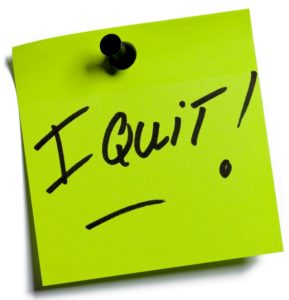Over the summer, I caught up with Susan, one of my favorite college classmates, over brunch. Even though Susan and I never worked together, I always admired and loved working with her on school projects. We both became consultants at different firms. Over the years I continued to run into Susan and her colleagues at the airport so we stayed in touch quite often.
To no surprise, Susan’s colleagues gushed time and time again about her. She was smart, hardworking, politically savvy, and had a very likable personality. She was the go-to person for clients, coworkers, and leadership alike. I watched over the years as Susan continued to climb up the ladder at her firm and we would joke about her eventually fulfilling her world domination plans. On the outside looking in, it seemed like the sky was the limit for Susan’s career and the firm she worked at was a slam dunk.
Until it wasn’t.
Susan recently handed in her resignation and this news came as a surprising blow to her former firm.
For Susan, this was years in the making.
Why did Susan, a long time firm rockstar and a favorite leader, decide to leave? A changing culture.
“When I joined the firm 13 years ago, the leadership created an amazing culture of high growth, development, and community. But over the years, many of the leaders I grew up with retired. And then the firm started hiring a lot of new leaders with different values because of their ability bring in revenue. What the leaders failed to realize is that this changed the culture of the firm over time. I do not recognize or identify with the company anymore.”
I asked Susan, “What about your leadership team, mentors & sponsors? Where do they stand in all of this?”
Susan replied, “Yes, I have had an amazing support system of leaders over the year. But the culture had gotten so bad that even they cannot change it either.”
Up until my meeting with Susan, I had always believed that people quit leaders not companies. But then I realized that there is probably another way to look at it. It is more than just leaders.
People do not just quit companies or leaders…they quit organizational cultures.
According to a Harvard Business Review article, apparently employees leave both good and bad bosses at almost comparable rates. The article shares: “Good leadership doesn’t reduce employee turnover precisely because of good leadership. Supportive managers empower employees to take on challenging assignments with greater responsibilities, which sets employees up to be strong external job candidates.”
So what actually comprises of an organizational culture?
Organizational culture, in its simplest form, is an ecosystemic mashup of values, beliefs, underlying assumptions, symbols, rituals, attitudes, and behaviors shared by a group of employees and driven by leadership. Culture is the behavior that results when a group arrives at a set of – generally unspoken and unwritten – rules for working together.
I then asked my social media network why they would leave a company. 40+ people generously shared example after example, story after story all pointing back to culture that I have distilled into 5 components:
Misaligned vision and leadership
Limited company vision. No perspective of where the organization is going. Why are we are investing time, money and resources without a goal.
“Not being able to see how my role are fits into the bigger picture.”
I have left companies and projects primarily because things aren’t a good fit for me.
If leadership does not have a vision big enough for an individual’s personal goals and dreams to be achieved they will look elsewhere.
Leadership acted differently when they are going to sell a company vs growing it.
When a company’s values contradict their business decisions, the mismatch begins to tear down the trust.
Compromised values, beliefs, and increased toxicity
When employees feel that they are being coerced into doing things that don’t align with their values they will find other places to use their talents.
Constant burnout with favoritism, gossip, and disrespectful people.
Mediocrity was accepted as good enough.
Lack of allowing creativity / new ideas, and condescending attitudes.
Abuse in the workplace such as underpayment or demands exceedingly unrealistic responsibilities.
You can be the most motivated and driven individual on your team but sometimes it isn’t enough. It requires the collective efforts of an entire team to truly achieve the company’s mission.
Lack of connection, appreciation, community, and affinity
Not challenged, appreciated or feeling disconnected from the team and the organization as a whole.
An extroverted workplace with no flexibility for introverts to manage their energy and time to produce their best work.
Discouragement due to lack of visible progression of women and people of color in leadership roles.
Uncertainty during hard times and massive change
I saw a lack of faith from some folks at my own company during the recession. We’ve always had a strong people/family-oriented culture, but during that time and a couple of years after we got away from it and several key people left.
The company owner’s fear of the business going under was getting in the way of us actually being able to solve problems that would help the business run better.
Organizational structures & processes that create malaise and stagnation
I was in a culture where it wasn’t safe to fail, to express yourself, to grow, or to be heard.
Lack of a feedback mechanism. Too many people to confirm with for simple decisions.
Culture of impossible wins with unattainable and unrealistic goals setting.
Not having structured processes that support workplace flexibility have forced people to leave.
I couldn’t stand the waste. Wasted time in meetings, wasted use of resources, and wasted opportunities.
I get really bored when I stop learning and that dramatically reduces motivation and output.
I felt that I wasn’t learning at the rate I wanted to learn and saw no future for career growth.
I wasn’t learning new things (being developed as an employee or leader.) And I wasn’t being leveraged to do the things I brought to the table.
What do you think employees and leaders can do to help steer the ship of an organizational culture?
Thanks to Susan for inspiring this effort, best of luck in your new role.
Many thanks to my social media network for contributing to this blog post – including those that preferred to remain anonymous. You rock! Tim Knight, Titania Veda, Sean Wachsman, Bill McArthur, Jay Morales, El Peterson, David Vaassen, Megan O’Leary, Tina Huynh, Kristin Jekielek, Su-Ann Lim, Doreen Chen, Keri Robinson, Lisa Guida, Julien Fortuit, Chrissanne Long, Kwame Sarfo-Mensah, Kishshana Palmer, Francesca Lujan, Anthony Palmer, Nathan Kituuma, Ibinabo Koleosho, Janell Powell , Luis Vazquez , Donald Weber, Jr. Nick Burnett , Leanne Castro


